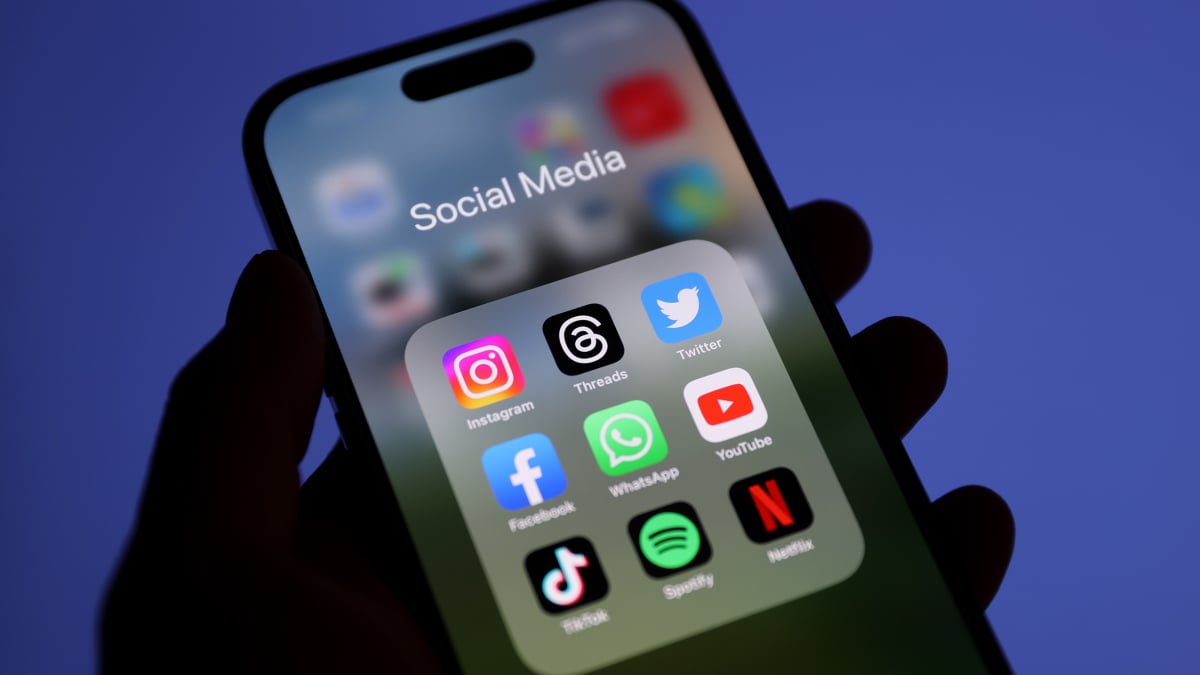Entertainment
Study finds LGBTQ youth of color feel safest on TikTok, despite online hate concerns

For LGBTQ youth, social media is a double-edged sword: a digital public space that acts as both an important lifeline for identity-based community and an increasingly dangerous threat to their mental wellbeing.
And a new research brief from nonprofit The Trevor Project documents just how much this dynamic affects the online behavior of LGBTQ young people of color, specifically. According to the organization’s 2023 data — based on a national youth survey of more than 28,000 LGBTQ young people ages 13-24 across the U.S. — these young users are seeking out forms of online community most frequently through popular social platforms like TikTok. Plus, they’re reporting a significantly higher impact of positive online experiences on their mental health.
“Feeling safe and understood in at least one online space is associated with lower suicide risk and lower rates of recent anxiety for all LGBTQ young people, and for LGBTQ young people of color in particular,” writes the organization.
“Overall, LGBTQ young people who reported feeling safe and understood in at least one online space had 20 percent lower odds of attempting suicide in the past year, compared to LGBTQ young people who reported not feeling safe and understood in any online space.”
According to survey responses, TikTok leads as most respondents’ go-to platform for online comfort and safety, with 53 percent of LGBTQ young people of color reporting feeling safe and understood on the app. The social messaging platform Discord ranked next (42 percent), followed by Instagram (41 percent), and YouTube (33 percent).

Credit: The Trevor Project
The Trevor Project also found that responses and their severity differed greatly between white LGBTQ youth and LGBTQ youth of color, with the latter reporting significantly lower rates of feeling safe and understood on Reddit, Twitch, Steam, Facebook, and dating apps.
“Our research examines the online experiences of LGBTQ young people through an intersectional lens, highlighting the unique factors that race and ethnicity play in determining which social platforms feel safest,”said Wilson Lee, senior machine learning research scientist at The Trevor Project. “These data are especially relevant as federal and state lawmakers are considering legislation that seeks to regulate how young people interact with the internet.
“Online spaces can serve as a protective factor for suicide risk and anxiety for LGBTQ young people who may not feel safe at home or in school, further emphasizing the crucial need to protect access to social platforms that affirm diverse LGBTQ identities.”
In June, the Anti-Defamation League released its own findings on digital hate and harassment, documenting that more than half of adults and teens have experienced online harassment in their lifetimes. The report pointed to increased reports of harassment on Facebook, Instagram, YouTube, WhatsApp, and even TikTok. These numbers were the highest among transgender users, and differed greatly among users of color.
That same month GLAAD issued its updated 2023 Social Media Safety Index, which scores the “Big 5” social media platforms (Twitter, TikTok, Instagram, YouTube, and Facebook) on their protections for LGBTQ users. The index found that Twitter was the most unsafe for LGBTQ users at risk of hate and harassment, with the four other platforms still receiving failing grades.
More broadly, research is casting a critical light on unmoderated social media use. In May, the U.S. Surgeon General issued a warning about youth social media use, writing in a national advisory that there isn’t enough evidence to conclude that social media is sufficiently safe for young people to use.
Want more Social Good stories in your inbox? Sign up for Mashable’s Top Stories newsletter today.
But even with these warnings — and a varied response from tech giants advertising parental controls amid legal action for their reported role in a national mental health crisis — social media isn’t going anywhere, and it’s still serving a positive role for many of its users.

Credit: The Trevor Project
While acknowledging the waning protections for many marginalized users on social media platforms, the Trevor Project also makes the case for the often life-saving role online online spaces play in the lives of young people craving connection and acceptance, hinting at vitally-needed nuance when taking on social media study. It also provides grounds for preferred platforms to step up for their LGBTQ users. “Adults who hope to make recommendations about online spaces to LGBTQ young people of color must consider both their LGBTQ and racial / ethnic identities to provide recommendations that are the most likely to be safe for them, as some spaces may currently be less safe for young people who hold multiple marginalized identities,” writes the organization.
The need for a deeper understanding of individual social media use is shared across the industry and among academics, as technology has become a domineering space for identity-building and social connection. “Experts who work with LGBTQ youth say there are ways to use social media as a lifeline for connection while continuing to guard against the risks,” writes Mashable’s Rebecca Ruiz. “These strategies include being aware of potential harms, asking for help when necessary, noticing personal stress cues, and developing related coping skills.”
Academics and influencers alike suggest educated, mindful social media use combined with a balance of “restorative offline activities” and positive coping practices, Ruiz reports.
Implicitly, LGBTQ youth of color might feel safer on platforms like TikTok and Discord because they enable a kind of identity-centered curation, allowing users to join communities or “customize” their feeds with other, similar users or comfortable topics, one way of easing into social media use. A bigger leap: LGBTQ users can also turn towards LGBTQ-specific sites and avoid platforms with failing safety grades. The Trevor Project hosts its own platform, TrevorSpace, intended to act as an affirming online community for LGBTQ young people exploring their identities, finding peer support, and making friends in moderated communities.
“Overall, these findings underscore the benefits that online spaces may have for LGBTQ young people of color, and identify some of the key online spaces where they feel safe and understood,” The Trevor Project writes. “It is important to note that the landscape of online spaces is ever-changing. Appropriate digital literacy training that teaches LGBTQ young people of color how to responsibly learn, create, and participate in online spaces may be key to ensuring their long-term well-being online.”
If you’re feeling suicidal or experiencing a mental health crisis, please talk to somebody. You can reach the 988 Suicide and Crisis Lifeline at 988; the Trans Lifeline at 877-565-8860; or the Trevor Project at 866-488-7386. Text “START” to Crisis Text Line at 741-741. Contact the NAMI HelpLine at 1-800-950-NAMI, Monday through Friday from 10:00 a.m. – 10:00 p.m. ET, or email [email protected]. If you don’t like the phone, consider using the 988 Suicide and Crisis Lifeline Chat at crisischat.org. Here is a list of international resources.
Live Through This creator Dese’Rae L. Stage gave Mashable the following additional information about crisis and warmlines: “Many of these resources utilize restrictive interventions, like active rescues (wellness or welfare checks) involving law enforcement or emergency services. If this is a concern for you, you can ask if this is a possibility at any point in your conversation. Trans Lifeline does not implement restrictive interventions for suicidal people without express consent. A warmline is also less likely to do this, but you may want to double-check their policies.”
-

 Business7 days ago
Business7 days agoMood.camera is an iOS app that feels like using a retro analog camera
-

 Business6 days ago
Business6 days agoUnitedHealth says Change hackers stole health data on ‘substantial proportion of people in America’
-

 Business5 days ago
Business5 days agoTesla’s new growth plan is centered around mysterious cheaper models
-

 Business4 days ago
Business4 days agoXaira, an AI drug discovery startup, launches with a massive $1B, says it’s ‘ready’ to start developing drugs
-

 Business5 days ago
Business5 days agoUK probes Amazon and Microsoft over AI partnerships with Mistral, Anthropic, and Inflection
-

 Entertainment3 days ago
Entertainment3 days agoSummer Movie Preview: From ‘Alien’ and ‘Furiosa’ to ‘Deadpool and Wolverine’
-

 Business6 days ago
Business6 days agoTwo widow founders launch DayNew, a social platform for people dealing with grief and trauma
-

 Entertainment6 days ago
Entertainment6 days agoTesla’s in trouble. Is Elon Musk the problem?




























